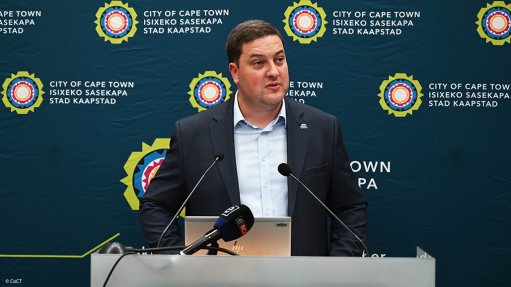
Geordin Hill-Lewis
The City of Cape Town Mayoral Committee (Mayco) has greenlit the creation of a Development Charges Fund to support micro-developers in building affordable housing in lower-income communities.
The fund will subsidise development charges for small-scale rental unit developments, in order “to stimulate the affordable housing market and attract investment in targeted areas”.
Following Mayco approval, the proposal will now serve on the city council’s March agenda.
“Our aim is to unlock much more affordable housing across the city,” says Mayor Geordin Hill-Lewis.
“This is an important step that has the potential to unlock investment in new affordable housing development far faster than government can build.
“This is harnessing the power of private investment to achieve an important public outcome – more affordable accommodation.”
The Cape Town city council aims to kick-start the new fund with an initial R20-million to subsidise qualifying micro-developers on a first-come, first-served basis.
Subsidies will be available to stimulate the development of more affordable housing units in 194 targeted areas, including Beacon Valley, Bloekombos, Delft, Dunoon, Enkanini, Fisantekraal, Gugulethu, Joe Slovo, Khayelitsha, Strandfontein, Steenberg, Scottsdene, Saxonsea, Retreat, Philippi, Ocean View, Nyanga, Nomzamo, Langa, Lavender Hill, Vrygrond, Wallacedene and Westridge.
“The subsidy covers up to 90% of development charges, which the city generally uses to pay for bulk services to support development, such as roads, stormwater, water, sewerage, public transport and waste removal,” says Hill-Lewis.
The city says it is also aiding micro-developers to unlock more affordable housing through setting up local planning support offices in the targeted areas, which ensures accessible approvals and support; the development of compliant off-the-shelf building plans to make approval much quicker; and the promotion of alternative building materials and practices.
“Cape Town has a thriving construction industry with micro-developers developing affordable rental accommodation at scale, mostly in formal neighbourhoods.
“The city now wants to support and encourage the development of affordable rental accommodation in informal areas by targeting micro-developers who build rental units at a smaller scale – this could be any entrepreneur building six to 12 rental units on an erf,” says Deputy Mayor and Spatial Planning and Environment MMC Eddie Andrews.
“A micro-developer could also be a land owner with an erf big enough to build small scale rental units in their backyard, that are complying with building regulations, and connected to the city’s services infrastructure.
“Once the Development Charges Fund has been approved by council, these property owners can apply to the city for their development charges to be subsidised from this fund, which will significantly bring down the cost of building the rental units,” explains Andrews.
“In so doing, the city can assist lower-income families to fully utilise their properties to earn an income from rental units, and at the same time these property owners and other micro-developers will assist with the supply of affordable rental accommodation in areas where it is most needed.”